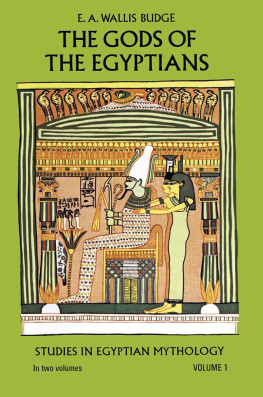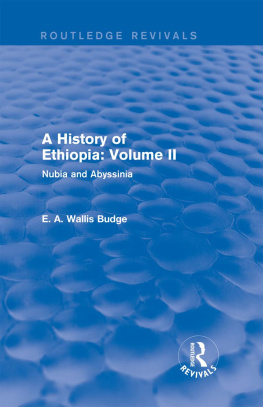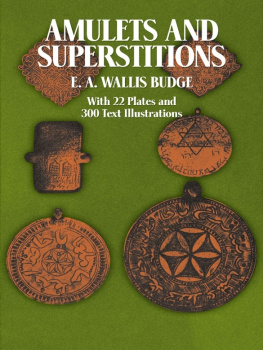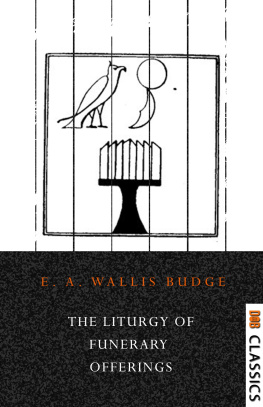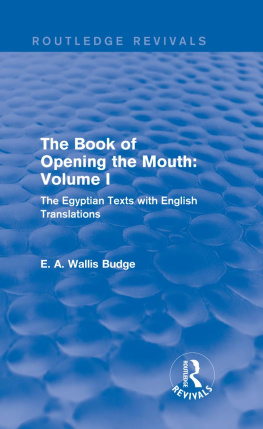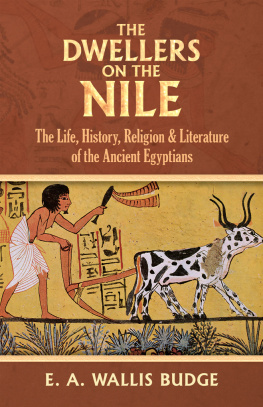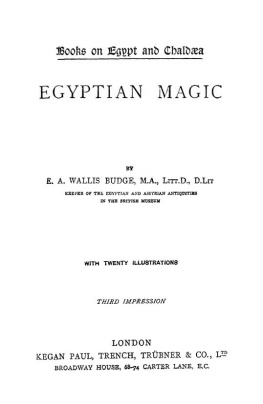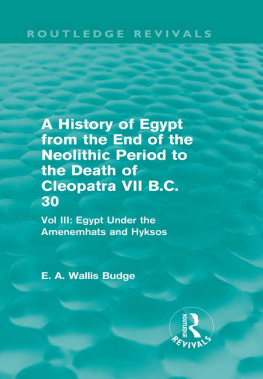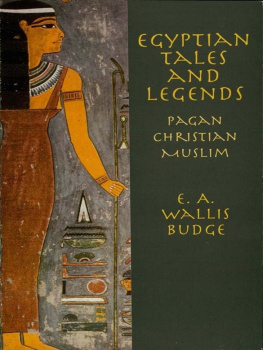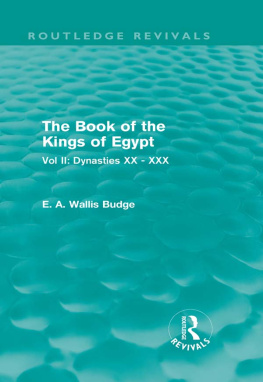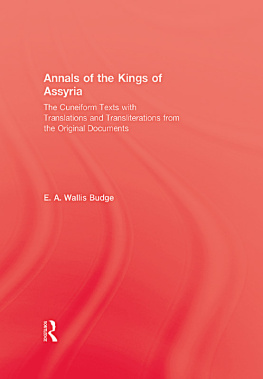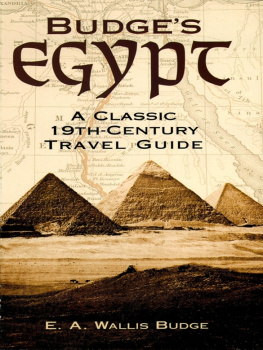E. A. Wallis Budge - Gods of the Egyptians, Volume 1
Here you can read online E. A. Wallis Budge - Gods of the Egyptians, Volume 1 full text of the book (entire story) in english for free. Download pdf and epub, get meaning, cover and reviews about this ebook. year: 2013, publisher: Dover Publications, genre: Religion. Description of the work, (preface) as well as reviews are available. Best literature library LitArk.com created for fans of good reading and offers a wide selection of genres:
Romance novel
Science fiction
Adventure
Detective
Science
History
Home and family
Prose
Art
Politics
Computer
Non-fiction
Religion
Business
Children
Humor
Choose a favorite category and find really read worthwhile books. Enjoy immersion in the world of imagination, feel the emotions of the characters or learn something new for yourself, make an fascinating discovery.
- Book:Gods of the Egyptians, Volume 1
- Author:
- Publisher:Dover Publications
- Genre:
- Year:2013
- Rating:4 / 5
- Favourites:Add to favourites
- Your mark:
- 80
- 1
- 2
- 3
- 4
- 5
Gods of the Egyptians, Volume 1: summary, description and annotation
We offer to read an annotation, description, summary or preface (depends on what the author of the book "Gods of the Egyptians, Volume 1" wrote himself). If you haven't found the necessary information about the book — write in the comments, we will try to find it.
Gods of the Egyptians, Volume 1 — read online for free the complete book (whole text) full work
Below is the text of the book, divided by pages. System saving the place of the last page read, allows you to conveniently read the book "Gods of the Egyptians, Volume 1" online for free, without having to search again every time where you left off. Put a bookmark, and you can go to the page where you finished reading at any time.
Font size:
Interval:
Bookmark:
THE EGYPTIANS
OR STUDIES IN EGYPTIAN
MYTHOLOGY
BY
E. A. WALLIS BUDGE
Late Keeper of the Egyptian and Assyrian
Antiquities in the British Museum
IN TWO VOLUMES
Volume I
DOVER PUBLICATIONS, INC.
NEW YORK
This Dover edition, first published in 1969, is an unabridged republication of the work originally published by The Open Court Publishing Company, Chicago, and Methuen & Company, London, in 1904.
In addition to the 131 text illustrations from the standard edition, this reprint includes black-and-white halftone reproductions of the 98 color plates from the limited edition. Six of these plates are also reproduced in full color on an insert attached to the inside back cover of Volume II of this edition.
International Standard Book Number eISBN 13: 978-0-486-14152-7
Library of Congress Catalog Card Number: 72-91925
Manufactured in the United States by Courier Corporation
22055921
www.doverpublications.com
I
DEDICATE THIS BOOK
ON
THE GODS AND MYTHOLOGY OF EGYPT
BY PERMISSION
TO THE RIGHT HONOURABLE
THE EARL OF CROMER
PRIVY COUNCILLOR, G.C.B., G.C.M.G., K.C.S.I., C.I.E.
THE REGENERATOE OF EGYPT
WITH
SINCERE GRATITUDE AND RESPECT
A MONG the various branches of Egyptology which have been closely studied during the last twenty-five years, there are none which are more interesting to inquire into, or more difficult to understand fully, than the religion and mythology of the inhabitants of the Valley of the Nile. When we consider the number of works on these subjects which have been written and published, both by expert Egyptologists and by competent exponents of the science of religion during that period, such a statement may appear at first sight to be paradoxical, and many may think when reading it that some excuse must certainly be made for the philosopher who asked an eminent professor of Egyptology the somewhat caustic question, Is it true that the more the subjects of Egyptian religion and mythology are studied the less is known about them ? The question is, however, thoroughly justified, and every honest worker will admit that there are at the present time scores of passages, even in such a comparatively well-known religious compilation as the Book of the Dead, which are inexplicable, and scores of allusions of a fundamentally important mythological character of which the meanings are still unknown. The reasons for this state of things are many, and the chief of them may be briefly recalled here.
The custom of relying absolutely upon the information about the ancient Egyptian religion and mythology, which is reported by Greek historians, was abandoned by Egyptologists long ago, for as soon as the native Egyptian religious texts could be read, it became evident that no Greek or Latin writer had any exact first-hand knowledge of these subjects, and that none of them succeeded wholly in reproducing accurately in their works the facts concerning them which they derived from Egyptian books or from Egyptian priests. This is hardly to be wondered at, for the cultured Greek writers must have, and did, as we know, look with mingled pity, and contempt, and ridicule, upon the animal cults of the Egyptians, and they had no sympathy with the materialistic beliefs and with the still more materialistic funeral customs and ceremonies, which have been, from time immemorial, so dear to certain Hamitic peoples, and so greatly prized by them. The only beliefs of the Egyptian religion which the educated Greek or Roman truly understood were those which characterized the various forms of Aryan religion, namely, the polytheistic and the solar; for the forms of the cults of the dead, and for all the religious ceremonies and observances, which presupposed a belief in the resurrection of the dead and in everlasting life, and which had been in existence among the indigenous inhabitants of north-east Africa from predynastic times, he had no regard whatsoever. The evidence on the subject now available indicates that he was racially incapable of appreciating the importance of such beliefs to those who held them, and that although, as in the case of the Ptolemies, he was ready to tolerate, and even, for state purposes, to adopt them, it was impossible for him to absorb them into his life. It is important to remember this fact when dealing with the evidence of Greek and Roman writers on the Egyptian religion and mythology, for it shows the futility of trying to prove an absolute identity in the indigenous religions of the Aryans and Egyptians.
Now, although a true decipherment of the ancient Egyptian hieratic and hieroglyphic texts has enabled us to draw our information on the religion and mythology of Egypt from native sources, we have still to contend against the ignorance of Egyptian scribes and the mistakes of careless copyists, and it must never be forgotten that the theologians at the court of the Pharaohs under the XVIIIth and XIXth Dynasties were just as ignorant of many facts connected with their religion and mythology as we ourselves are. In proof of this it is sufficient to refer to the different explanations of certain passages which are given along with the text in the xviith Chapter of the Book of the Dead, and to the childish punning etymologies of the names of gods and of many mythological explanations which are set down in the texts inscribed on the walls of some chambers in the tomb of Seti I. at Thebes, and on the walls of the temple of Horus of Be u
u et at Edf. It is satisfactory to be able to say that many of the absurd etymologies and trivial explanations which are products of the scribes of old can now be corrected. Recent researches have shown that the royal scribes under the New Empire (B.C. 1700-700) were unable to read correctly the hieratic characters which formed the names of some of the kings of the early Archaic Period, and this being so, little surprise need be felt at the difficulties in religious texts which are due to their ignorance or blunders. Apart from such considerations, however, the subjects of Egyptian religion and mythology themselves are full of inherent difficulties, which have, unfortunately, not been lessened by the manner in which some Egyptologists have treated them.
et at Edf. It is satisfactory to be able to say that many of the absurd etymologies and trivial explanations which are products of the scribes of old can now be corrected. Recent researches have shown that the royal scribes under the New Empire (B.C. 1700-700) were unable to read correctly the hieratic characters which formed the names of some of the kings of the early Archaic Period, and this being so, little surprise need be felt at the difficulties in religious texts which are due to their ignorance or blunders. Apart from such considerations, however, the subjects of Egyptian religion and mythology themselves are full of inherent difficulties, which have, unfortunately, not been lessened by the manner in which some Egyptologists have treated them.
The number of the gods, even under the IVth Dynasty, about B.C. 3600, was very great, and as time went on it multiplied greatly. The Pyramid Texts, which were written under the IVth, Vth and VIth Dynasties, supply the names of about two hundred gods and mythological beings, but in the Book of the Dead according to the Theban Recension (B.C. 1700-1200) over five hundred gods are mentioned. If to these be added the names of all the mythological beings which occur in the various Books of the Underworld, we shall find that the number of the gods who were recognized by the theologians of the XIXth Dynasty at Thebes was about twelve hundred. If all the religious texts of this period from all the religious centres of Egypt were available for study, we should certainly find that the names of hundreds of additional local gods, goddesses, and mythological beings could be collected from them. With such a number of gods to consider, it was impossible for confusion not to arise in the mind of the Egyptian when dealing with them, and the texts prove that he found the gods as difficult to group and classify as the modern investigator. The attributes of hundreds of them were vague and shadowy, and the greater number of them were merely provincial gods, to whom circumstances had given some transient importance, which resulted in their names being recorded in writing. In fact, the theologian of ancient Egypt found it impossible to form a system of gods which should be consistent in all its parts, and should assign to earth gods, water gods, air gods, village gods, city gods, nome gods, national gods, and foreign gods, the exact position and attributes which were their due in it. From one point of view the modern investigator is more fortunate than the Egyptian theologian, for he has more materials upon which to work, and, as a rule, he is better equipped for his inquiry. The Egyptian knew nothing about the study of comparative religion, and he was sadly hampered by his own methods.
Font size:
Interval:
Bookmark:
Similar books «Gods of the Egyptians, Volume 1»
Look at similar books to Gods of the Egyptians, Volume 1. We have selected literature similar in name and meaning in the hope of providing readers with more options to find new, interesting, not yet read works.
Discussion, reviews of the book Gods of the Egyptians, Volume 1 and just readers' own opinions. Leave your comments, write what you think about the work, its meaning or the main characters. Specify what exactly you liked and what you didn't like, and why you think so.

